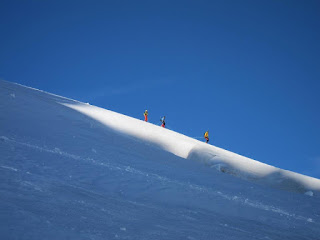Among family, friends and colleagues I’ve observed a fairly consistent response to the rapidly evolving Covid-19 crisis. Over the past two weeks, most conversations and social media feeds seem to be dominated by people striving valiantly for a sense of normalcy — hustling to establish new family and work routines, leading or participating in Olympic-inspired fitness schedules, becoming yogis, creating Montessori schools on their kitchen tables and orchestrating family lockdown adaptations of Les Misérables. They hope to buckle down for a short stint until life returns to normal.
Even with my ‘glass half full’ outlook on life and my own quarantine-driven aspirations to become a Michelin-star chef, whilst I wholeheartedly applaud the energy, drive and creativity to do this, I wish anyone who pursues that path the best of luck...
Behind this scramble for short-term productivity is a futile assumption. The answer to the question everyone is asking — "When will this be over?" — is simple, yet hard to accept. The answer is... never.
Here’s the reality. Global crisis and catastrophes change the world. Even if we contain the Covid-19 crisis within a few months, the lasting impacts of this pandemic will shape our future for years, perhaps decades to come. The way we move, build, spend, learn, and connect will be changed forever. There’s no way that our lives will resume as if this had never happened. And so, while it might feel good in the moment or in the short-term, it’s foolish to dive into a frenzy of activity or obsess about our personal productivity right now. Instead, it’s healthier to embrace the new normal. The mentally, emotionally and spiritually sane response for all of us is to prepare to be forever changed.
I’m struggling like everyone else - searching for answers, balance and following my own coping mechanisms. There are days that I struggle to get out of bed. There are also days that I find myself in a frenzy of baking, drawing and bending into downward dogs until 2am. To help navigate the new normal (in whatever form that takes), I’ve started drawing from experience in previous crises and those shared by others. These have included natural disasters, political and economic unrest and uncertainty and personal challenge.
Based on this, I thought I’d share a few thoughts and observations below in the hope that it provides some useful ideas as “physical distancing” and “PPE” become part of our everyday vernacular.
Mobilize
“Take the first step, and your mind will mobilize all its forces to your aid. But the first essential is that you begin. Once the battle is startled, all that is within and without you will come to your assistance.” - Robert Collier
Your first few days and weeks in a crisis are crucial. Make plenty of room to allow for a mental adjustment - it’s completely normal to feel bad, lost and pretty discombobulated. Consider it a good thing that you’re not in denial and that you’re allowing yourself to work through the anxiety that is completely natural. No sane person feels good during a global disaster - be grateful for the discomfort of your sanity. At this stage, focus on essentials like food, family, friends, and maybe fitness. (Spoiler alert: You won’t become an Olympic athlete or a yogi in the next two weeks, so don’t put ridiculous expectations on your body.)
Next, ignore everyone posting ‘productivity porn’ on social media. It’s ok that you keep waking up at 2am. It’s ok that you forgot to eat lunch, ate a bag of Doritos for dinner and can’t find the willpower to do a Zoom yoga class. It’s ok that you haven't completed a 10,000 piece jig-saw puzzle. Ignore those who are posting that they are baking cakes, writing novels, recording podcasts and ignore those who are complaining that they can’t bake cakes, write novels or record podcasts. They’re on their own journey. Cut out the noise..
Know that you are not failing. Let go of all of the futile ideas about what you ‘should’ be doing right now. Instead, focus on your physical and psychological security. Your first priority should be on taking care of you and securing your surroundings. Stock your pantry with sensible essentials (that includes toilet paper, but food too), clean your house, organise a dedicated work space and make a coordinated family plan. l Have conversations with your loved ones about preparedness and contingencies. If you have a family member who is a front-line or essential worker, redirect your energies and support them as a top priority. Identify their needs, and then meet those needs.
Irrespective of what your family unit looks like, you’ll need a team in the weeks and months ahead. Come up with a plan of activities for social connectedness - while maintaining physical distancing - with a small group of family, friends, and/or neighbors. Identify the elderly and the vulnerable and make sure they’re included and receive the support they need to maintain physical, mental, emotional and spiritual well-being.
The best way to build a team is to be a good teammate. Take the initiative to ensure that you’re not alone. If you don’t put this psychological infrastructure in place, the mental, emotional and spiritual challenges of physical-distancing and potential self isolation and quarantine measures will be crushing. Build a sustainable and safe social unit now.
Shift
“Start where you are. Distant fields always look greener, but opportunity lies right where you are. Take advantage of every opportunity of service.” - Robert Collier
Once you’ve established yourself and your team, you’ll feel more stable, your mind and body will adjust, and you’ll begin to crave more demanding activities. Human beings, by nature, are incredibly resilient. Given time, your brain will reset to new crisis conditions, and your ability to do higher-level work will resume.
This mental shift to ‘stabilize’ will help you to return to being a great partner, friend, sibling, colleague, neighbor even under extreme conditions. But don’t rush or prejudge your mental shift - it will take time to transition to the new normal. A post I recently saw on Instagram: "Day 1 of Quarantine: ‘I’m going to meditate and do body-weight training.’ Day 4: *just pours the ice cream into the pasta*" — it’s funny but it also speaks directly to the issue.
Now more than ever, we must abandon the performative and embrace the authentic. Our essential mental shifts require humility and patience. Focus on real internal change. These human transformations will be honest, raw, ugly, hopeful, frustrating, beautiful, and divine. And they’ll be slower than many of us are used to. But therein is the opportunity and the growth. Be slow. Let this distract you. Let it change how you think and how you see the world. Because the world is our work. And so, may this tragedy tear down all our faulty assumptions, rid us of our bad habits, and give us the courage of bold new ideas.
Flow
“In every adversity there lies the seed of an equivalent advantage. In every defeat is a lesson showing you how to win the victory next time.” - Robert Collier
On the other side of this shift, as you embrace and accept a new normal, your wonderful, creative, resilient brain will be waiting for you. When your foundations are strong, build a weekly schedule that prioritizes the security of your home team, and then carve out time blocks for different categories of your life. Do the easy tasks first and work your way into the heavy lifting. Wake up early. The Zoom yoga classes, meditation and cake baking will be easier at this stage.
With time, things will start to feel more natural. The adaptations you’ll notice in your life will also make more sense, and you’ll find yourself more comfortable about changing or undoing what is already in motion. New ideas will emerge that would not have come to mind had you stayed in denial. Continue to embrace your mental shift. Have faith in the process. And continue to support your team.
Think of it as a marathon. If you sprint at the beginning, you’ll be sick on your shoes by the end of the month. Emotionally prepare for this crisis to continue for the long term, followed by a slow recovery. If it ends sooner, be pleasantly surprised. Right now, work toward establishing your wellbeing and productivity, under sustained conditions.
Of course, there will be a day when the pandemic is over. We’ll hug our neighbors and our friends. We’ll dance in the streets, embrace nature and the outdoors. We’ll return to our offices and parks and coffee shops. Our borders will reopen to freer movement. Our economies will one day recover.
Yet we’re just at the beginning of that journey. For most people, our minds haven’t yet come to terms with the fact that the world has already changed. Some of us are already feeling distracted and guilty for not being there enough for our family, friends and colleagues or using their time in isolation for bursts of physical and creative productivity. All of that is noise and denial - and right now, denial only serves to delay the essential process of acceptance, which will allow us to reimagine ourselves in this new reality and take the steps to move toward it.
So let’s keep going, everyone. Remember, on the other side of this journey of acceptance are hope and resilience. We will know that we can do this, even if our struggles continue for years. We will be creative and responsive, and we’ll find light in all the nooks and crannies. We’ll learn new recipes and make new friends. We will have projects we cannot imagine today, and we’ll inspire strangers we’ve not yet met. And we’ll help each other. No matter what happens next, together, we will be ready to move forward.
-------------
















































